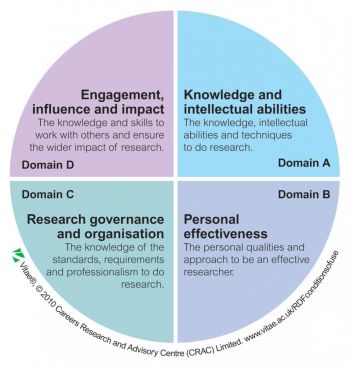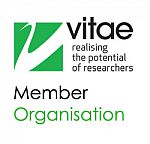Your Professional Development
Planning your professional development as a researcher will help you learn the skills you need to manage your research, and maximise your professional prospects.
An important first step in planning your development is to talk to your supervisors about your training needs - we recommend that you meet with your supervisors to do this within the first three months of starting your doctorate. During this meeting you should identify your needs and discuss ways of meeting them through the Researcher Development Programme, training provided by your School, and wider activities.
Your School may have a training needs analysis process in place which you should explore with your supervisors.
Your training record can be can found within the personal menu of Sussex Direct. This will help you remember what training you have attended at Sussex, and assist when you come to develop your CV, prepare for your annual review and write job applications. You are encouraged to add any development opportunities or training you undertake to your own record.
Researcher Development Framework (RDF)
The RDF describes the knowledge, behaviour and attributes of successful researchers, and is a useful guide for your development as a researcher. See the full version on the Vitae website.

Developed by Vitae in collaboration with researchers, institutions, funders and others in the higher education sector, the RDF is an incredibly useful tool you can use to identify the skills you need to develop and the areas you want to focus on in the next stage of your researcher journey.
How to use it
It’s up to you to decide what your priorities are, how you need to develop and how that can be achieved. You can use the framework to help you:
- explore all the aspects of being a researcher
- identify your strengths
- prioritise areas for professional development
- write a plan, then monitor progress and success
- have productive discussions with others, e.g. your supervisor, careers advisor or other professional development provider
- look for formal and informal development opportunities
- prepare for one-to-one progress reviews, appraisals or career development conversations with your research manager or mentor.
When you are looking at future career options and goals, the RDF helps you to:
- consider the capabilities and experiences that will enhance your career prospects
- assess opportunities provided by your institution and look for development opportunities outside your research
- highlight, articulate and provide evidence of the transferability of your capabilities and expertise in your CV, in job applications and at interviews.
Professional Development Planning

Vitae is an international programme led by the UK charity, Careers Research and Advisory Centre, working to enhance the potential of researchers.
Vitae's website has many useful resources including a professional development planning for researchers course. This online course, developed for researchers who want to make the most of opportunities and create new ones, covers all stages in the process.
All researchers have full access to the Vitae website if you register with your Sussex email address. Sussex does not subscribe to the RDF Planner.
See Also
- Researcher-Led Intiative Fund - for support in organising your own event, collaboration, research culture initiative or public engagement activity.
- Further development opportunities at Sussex and beyond.


